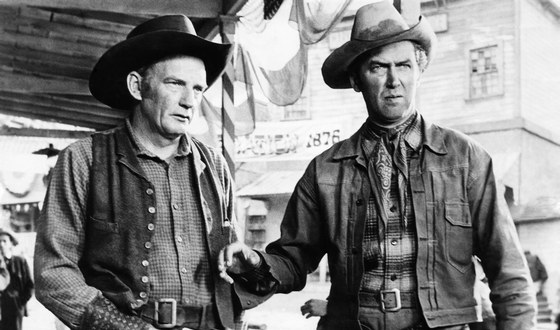
"He was less reckless than Sam Fuller, less passionate than
Nicholas Ray, yet in the framework of the Western he hit on
an almost perfect form with more consistency than either
of his peers - and fuelled it with pain." - Tom Charity (The Rough Guide to Film, 2007)
FromTurner Classic Movies
Director Anthony Mann defined the cowboys of
the ’50s, creating what critics dubbed the psychological Western. Taking a note
from film noir, Mann’s heroes were beset by past tragedies, frustrated
ambitions, and desperate to come to terms with their own torment — often by
battling villains who were all too similar to themselves. A capable
director in multiple genres, Mann didn’t need the Western — but the Western
needed him.
10. The Last
Frontier (1955)
Victor Mature plays a Davy Crockett-like
frontiersman who signs up to fight off warring Indians. Typically, Mann adds an
element of moral complication: Mature serves under a hawkish colonel whose main
interest isn’t in ending the conflict — but prolonging it! While a minor work
that just scratches onto this list, The Last Frontier shows that even
when he’s painting with light strokes, Mann deals in more sophisticated themes
than his contemporaries.
9. Devil’s Doorway
(1950)
Mann’s first Western is even more ambitious in describing the toxic
relationships between Native Americans and white-folk. Robert Taylor plays a
Shoshone Indian chief who fights courageously in Gettysburg, even winning the
Medal of Honor. But when the Civil War hero returns home, he find truculent
whites squatting on his land. The audience is meant to root for the Indians —
Mann’s boldness earns this one the ninth slot.
8. The Tin Star
(1957)
Here, Henry Fonda plays a typical Mann outsider. A former sheriff
turned bounty hunter, he likes living on the periphery with no one to answer to
but himself. But soon he gets stuck helping an effete Anthony Perkins learn
some pistol skills so he can clean up a town. This one’s made of more
conventional material than some of Mann’s Westerns, but it’s done so well
you’ll hardly notice the shift.
7. The Far Country
(1954)
You know the type: Solitary, introverted, doesn’t play well with
others. They usually have delusions of grandeur. In The Far Country,
Jimmy Stewart plays a prospector in the Klondike who doesn’t care about anyone
but himself and his precious gold flakes. But will the death of a friend
finally make him care about someone but himself? Part of the genius of this
movie is the sheer level of unscrupulousness it allows Stewart before he
changes his ways.
6. The Man from
Laramie (1955)
Poor Jimmy Stewart suffers numerous indignities
in this movie as he infiltrate a frontier town in an effort to shed light on
his… shadowy past. (His efforts earn this one sixth place.) But all his
sufferings only amp up the audience’s bloodlust for revenge! You don’t mess
with a man’s mules (they get shot) or his shooting hand (which gets plugged at
point-blank range). It’s easy to imagine fans of Mr. Smith Goes to
Washington chomping at the bit for dear old Stewart to blast away the bad
guys.
5. The Furies
(1950)
This was a switch-up pitch from Mann — a lesser known work that’s also
one of his most interesting. Taking its cues from Greek tragedy, The Furies
focuses on the subtly unseemly relationship between widowed cattle-baron Walter
Huston and his daughter Vance Jeffords (a typically wonderful Barbara
Stanwyck). The movie’s bold Freudian symbolism and fraught familial conflicts
were ahead of its time — and make this one a lock for the top five.
4. Man of the West
(1958)
Gary Cooper puts in a great, latter-day performance in this dark,
unsung Western. Like a lot of Mann’s heroes, he’s a man who’s wounded by the
past. And when the past returns — in the form of his former outlaw buddy Dock
Tobin (a malicious Lee J. Cobb) — he must find a way to maintain his new
identity. The movie didn’t generate much enthusiasm when it was first released,
but later reappraisals (Jean Luc-Godard was a huge fan) have asserted it as one
of the great psychological Westerns.
3. Bend of the
River (1952)
Stewart plays an ex-Missouri raider who’s
found a new career: escorting wagon trains out West. But along the way he
discovers an uncomfortable fragment of his own past: an old chum (Arthur
Kennedy) who hasn’t given up his outlaw ways. Stewart saves Kennedy and invites
him to join the journey, but Kennedy decides he’d rather steal the settlers’
goods for his own profit. Will Stewart go along with it? For the suspense
hanging over that question, this one bends its way right into third place.
2. Winchester ’73
(1950)
This moody, noirish Western follows the gun of the title as it passes
through many, many hands. What could have been a gimmicky frame device (see the
short-lived Robert Altman TV series, Gun) becomes a powerful symbol of
the history of violence that interconnects its characters and finally leads to
a showdown between heavies Waco (Dan Duryea) and Lin McAdam (Stewart). For its
formal daring and and crackling suspense, it’s one of Mann’s best.
1. The Naked Spur (1953)
Our
number-one flick features Jimmy Stewart as you’ve rarely seen him — completely
and utterly immoral. This is the pinnacle of Mann and Stewart’s long run
together, and one of the best Westerns ever made. From start to finish it’s
engaging and provocative, and Stewart’s quest, to catch an old friend for reward
money, increasingly becomes not a noble mission but a crazed pursuit for money
no matter what the cost.
The climactic showdown in Winchester '73 involves Jimmy Stewart fighting and vanquishing his brother, played by Stephen McNally, not Dan Duryea.
ReplyDeleteFor the record, it's "champing at the bit." I liked the summaries, though. I wasn't aware of the Victor Mature movie and it's on my list of must-sees.
ReplyDelete